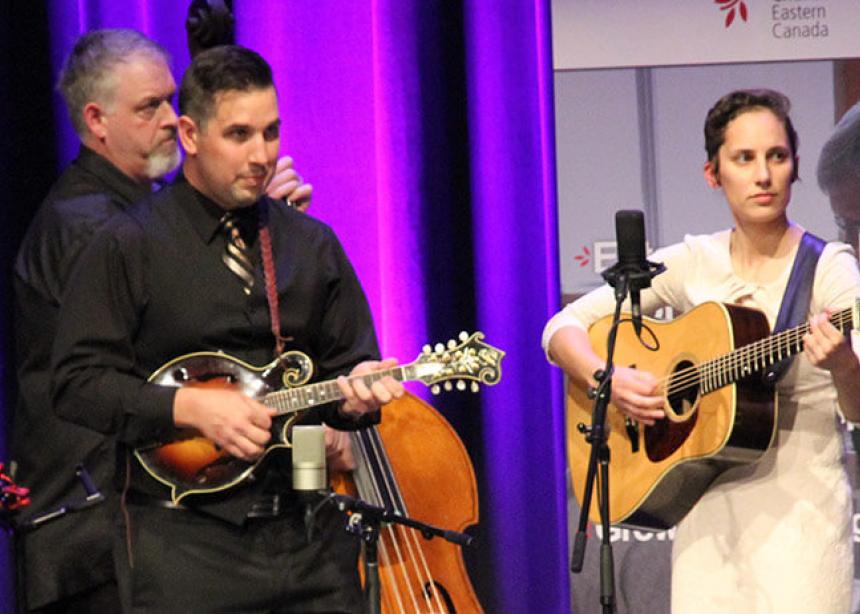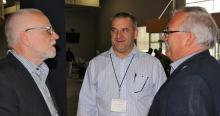When delegates from the churches of Mennonite Church Eastern Canada (MCEC) met in Oakville, Ont., on April 28 and 29, the focus was on re-commissioning, based on Matthew 28:19-20, where Jesus speaks to the disciples before his ascension. Read frequently in many languages, the words spoke to the many nations already present in the area church.
The Greater Toronto Area churches, who sponsored the event, made it clear that Oakville is not in Toronto, but the home campus of The Meeting House, a Brethren in Christ church which has 23 locations and over 10,000 attenders. The facility provided all that was needed for the gathering and did not require folk to drive right into Toronto’s frequent traffic problems.
Friday night provided congregations with an intimate look at ReLearning Community, a congregational resourcing initiative of MCEC together with Three Dimensional Ministry (3DM) from Europe. Kevin Peters Unrau, one of the pastors at Hillcrest Mennonite Church in New Hamburg, described the three dimensions: Up is one’s relationship with God; In means self-care and relationships; and Out is one’s relationships in the wider community. Of particular importance among the Out relationships is that with “a person of peace” connecting with Jesus’ advice to the seventy sent out in Luke 10 to find someone who returns their peace in a town and to stay with that person.
Testimonies from Andrea Warkentin from Leamington United Mennonite Church, Norm Dyck, the pastor at Listowel Mennonite Church, and Noramy Gonzalia Diaz, youth worker from First Mennonite Church in Kitchener, fleshed out how this is being done in many different ways in different communities. A further testimony from Jennifer Wickham, an Anglican priest, showed that intentionality is needed for Jesus’ church to spread the good news of God’s love.
Henry Paetkau, Area Church Minister for MCEC, spoke of this effort creating “a culture of disciple-making where disciples who can make more disciples are being made—disciples who live and love as Jesus did, living in the likeness of Jesus, sharing their faith” with others. Fifteen congregations are currently involved in this program, begun in 2014. One of the ten workshops invited new congregations to join ReLearning Community.
Bruxy Cavey, pastor of The Meeting House, and author of the recently released book, (Re)union, spoke on Saturday morning. In telling the story of “the eleven” who gathered to meet Jesus, Cavey noted that “God relates to our pain.” This story always remembers Judas who betrayed Jesus. The incarnate God knows our pain intimately. Cavey noted that while the group who heard the great commission worshipped Jesus, “some doubted.” The church is not a place where everything is summed up and answered—there will always be questions. We “follow while we have questions.” And in the ascension God remains human. With a transformed body God takes humanity to Godself through Jesus.”
Saturday’s business included a long-awaited end to the Warden Woods Community Centre (WWCC) building saga. Originally it was a combination church and community centre, and the ownership of the building has been in contention since the congregation closed in 2009. Through mediation the WWCC agreed that MCEC owns the building and dropped their litigation. MCEC will lease the building to WWCC for seven years (with up to six renewals) for $1 per year, retains an office in the building, and can use space up to 25 hours per week.
The Rehoboth Evangelical Church, an emerging Ethiopian congregation in Toronto, withdrew from MCEC citing a difference of theological orientation and has joined a Baptist group.
The Lao Canadian Evangelical Mennonite Church in Toronto moved to full membership in MCEC, and Hochma (formerly Roi des Rois) in Montreal, Meheret Evangelical Church in Kitchener, Oromo Evangelical Church of Ottawa (both Ethiopian congregations), and Westview Christian Fellowship in St. Catharines were accepted as emerging congregations.
Financial manager Sean East presented the financial statements showing a balanced budget through the use of the Faithful Steward Fund. This fund contains large bequests and MCEC can draw up to 15 percent of the capital in any year. In 2016-17, MCEC drew only 7.5 percent. The budget for 2017-2018 was again balanced through a 15 percent draw on the fund. The work of the Congregational Ministries Council has been shifted into Congregational Resourcing with no one staff person responsible.
Keith Regehr, Future Directions Interim Council Transitions Coordinator, made a presentation followed by discussion about the proposed structure for Mennonite Church Canada. He spoke to the five emphases: 1) Use of “Vision: Healing and Hope” as a vision statement for MC Canada; 2) Focus on the vitality of congregations; 3) Focus on the vitality of regional churches; 4) Focus on the viability of the national church; and 5) International Witness, working with the international church. But he admitted that “what witness will look like is not yet known.”
The gathering ended with Pieter Niemeyer of the Rouge Valley Mennonite Church and part of the hosting group, challenging the gathered delegates that “the status quo won’t do. We need to come to terms with our legacy of harm and exploitation. The Spirit calls us forward in humility with new ways to talk about faith, rooted in transformation.”






Add new comment
Canadian Mennonite invites comments and encourages constructive discussion about our content. Actual full names (first and last) are required. Comments are moderated and may be edited. They will not appear online until approved and will be posted during business hours. Some comments may be reproduced in print.